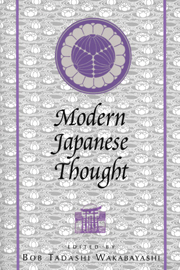5 - Japan's Revolt against the West
Published online by Cambridge University Press: 05 June 2012
Summary
introduction
Throughout most of Japan's modern history, the West has contributed to its formulation of theories of culture and action. At one level, the image of a monolithic West replaced an earlier interpretation of China as the “other.” In the twentieth century and especially after World War I, Japan's conceptualization of the West affirmed a theory of militant and articulate revolt against the “other,” usually imagined as a collective threat to Japan's national independence and cultural autonomy. The construction of the “other” required that it be portrayed as the mirror image of the indigenous culture. It was this representation of the “other” that clarified for the Japanese the essence of their own culture. This reversing of images was no less true in the Tokugawa period, when an idealized China had constituted the “other,” than in the twentieth century, when a monolithic West did. If the “other” defined what was exceptional in Japanese culture, it also offered a model of excellence against which such distinctiveness could be measured. Just as Tokugawa writers focused on the world of the ancient sages, changing it into an unhistorical abstraction whose values existed only in pure form in Japan, so twentieth-century thinkers imagined a Japan destined to reach new levels of achievements realized by no single Western nation. Through this doubling of images, they shaped a theory of action aimed at maintaining a pure, indigenous cultural synthesis protected from outside elements that might disturb the perceived equilibrium. It was precisely because Japanese saw the urgency of keeping their culture uncontaminated and hence preserving its essence against the threatened external pollution that many felt justified using militant forms of political and cultural action.
- Type
- Chapter
- Information
- Modern Japanese Thought , pp. 207 - 272Publisher: Cambridge University PressPrint publication year: 1998
- 35
- Cited by



